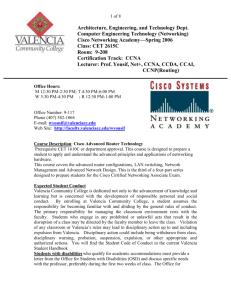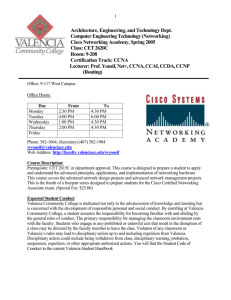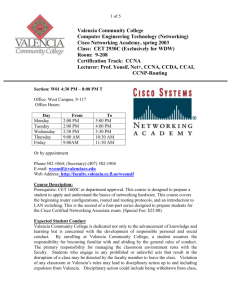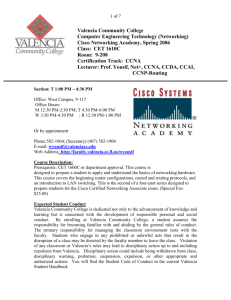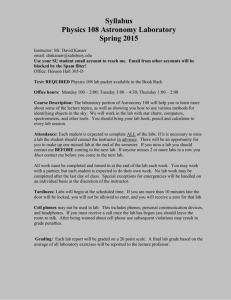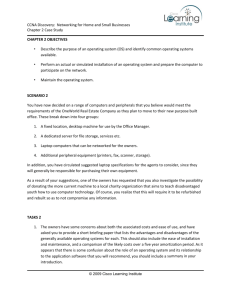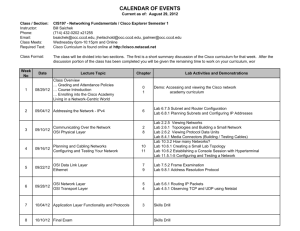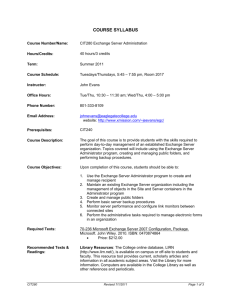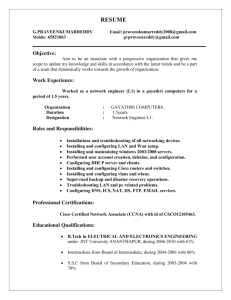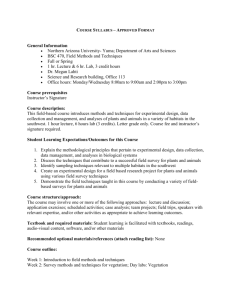Lecturer: Prof. Yousif, Net+, CCNA, CCDA, CCAI, CCNP(Routing)
advertisement
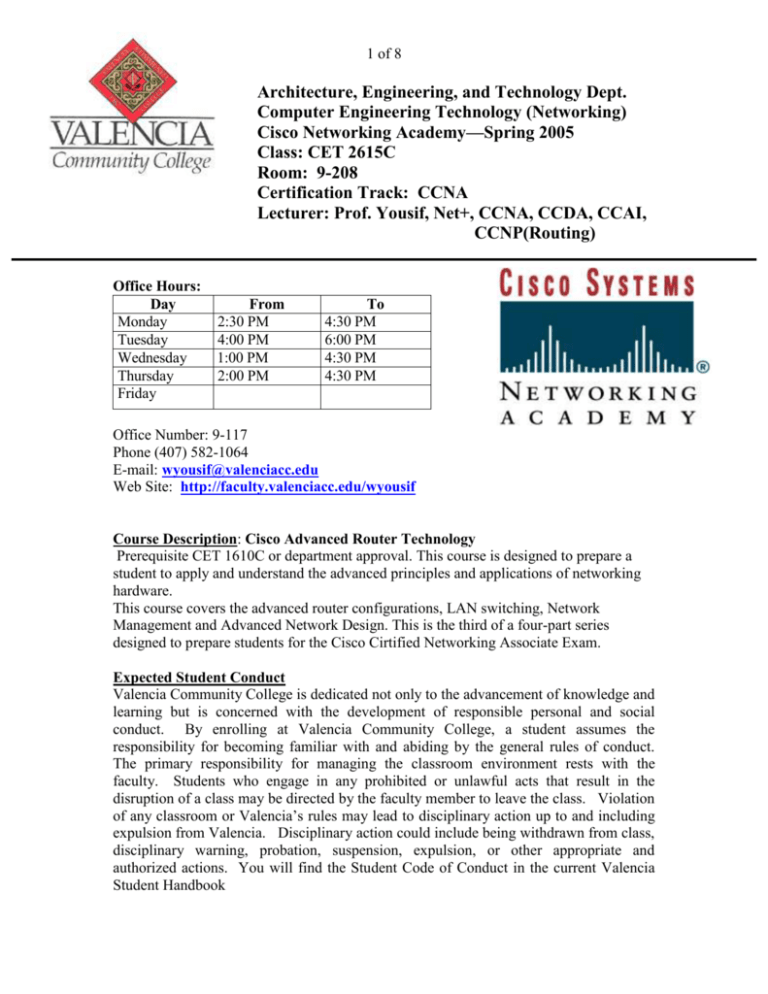
1 of 8 Architecture, Engineering, and Technology Dept. Computer Engineering Technology (Networking) Cisco Networking Academy—Spring 2005 Class: CET 2615C Room: 9-208 Certification Track: CCNA Lecturer: Prof. Yousif, Net+, CCNA, CCDA, CCAI, CCNP(Routing) Office Hours: Day Monday Tuesday Wednesday Thursday Friday From 2:30 PM 4:00 PM 1:00 PM 2:00 PM To 4:30 PM 6:00 PM 4:30 PM 4:30 PM Office Number: 9-117 Phone (407) 582-1064 E-mail: wyousif@valenciacc.edu Web Site: http://faculty.valenciacc.edu/wyousif Course Description: Cisco Advanced Router Technology Prerequisite CET 1610C or department approval. This course is designed to prepare a student to apply and understand the advanced principles and applications of networking hardware. This course covers the advanced router configurations, LAN switching, Network Management and Advanced Network Design. This is the third of a four-part series designed to prepare students for the Cisco Cirtified Networking Associate Exam. Expected Student Conduct Valencia Community College is dedicated not only to the advancement of knowledge and learning but is concerned with the development of responsible personal and social conduct. By enrolling at Valencia Community College, a student assumes the responsibility for becoming familiar with and abiding by the general rules of conduct. The primary responsibility for managing the classroom environment rests with the faculty. Students who engage in any prohibited or unlawful acts that result in the disruption of a class may be directed by the faculty member to leave the class. Violation of any classroom or Valencia’s rules may lead to disciplinary action up to and including expulsion from Valencia. Disciplinary action could include being withdrawn from class, disciplinary warning, probation, suspension, expulsion, or other appropriate and authorized actions. You will find the Student Code of Conduct in the current Valencia Student Handbook 2 of 8 Students with disabilities who qualify for academic accommodations must provide a letter from the Office for Students with Disabilities (OSD) and discuss specific needs with the professor, preferably during the first two weeks of class. The Office for Students with Disabilities determines accommodations based on appropriate documentation of disabilities (West Campus SSB 102, ext. 1523). Text Material Cisco Networking Academy Program: Second Year Companion Guide, Third Edition, Cisco Systems, Inc Lab Material Cisco Networking Academy Program CCNA 3 and 4 LAB Companion Third Edition CCNA Exam Preparation Kit CCNA – Certification Guide Companion by Wendell Odom, CCIE #1624 Cisco Press. ISBN: 1587200953 This is the official self-study test preparation package for the Cisco CCNA 640-801, ICND 640-811, and INTRO 640-821 exams Logging to the Academy www.cisco.netacad.net Student Name: first three letters of your last name + first Initial + _ + VCC Example: a student with the name of Wael Yousif would use: hoyd_vcc Student Password: First 3 letters of your last name + last 4 digits of your SS# Example: a student with the last name of Hoyte and SS# 123456789 would use hoy6789 Lab Procedures Will be done in lab 9-208 during class time, and cannot be made-up. If the student is absent on the day of the lab assignment he/she will not receive credit for that lab. In order to receive credit it would be at the discretion of the instructor. Chapter Tests Will be given at the beginning of the class and cannot be made up, so if the student is late or absent, he/she will not receive credit for that test. Changes in this rule is up to the instructor. Grading System End of Chapter Tests ---------------------------------------------- 25% Labs ------------------------------------------------------------------ 25% Case Study ---------------------------------------------------------- 10% Final Written (must pass to pass the course) ------------------- 25% Final Hands-On (must pass to pass the class) ----------------- 25% A B C D 90-100 80-89 70-79 60-69 DISCLAIMER: Any Changes in the policy and/or schedule of this syllabus may be made at anytime during the semester at the discretion of the instructor. 3 of 8 Week-by-Week Agenda Week CHAPTER/ DESCRIPTIONS Labs Tests Subnetting Group N/A Module 1 2/1 Introduction to Classless Routing Exercise Lab. 2.1 Calculating VLSM Subnets. Lab. 2.2 Review of Basic Router Confiuration with RIP. 2 2/1 Introduction to Configuring Static Classless Routing Routes Lab. 2.3 Convert RIP Version 1 to RIP Version 2. Lab. 2.4 Verifing RIP Version 2 configuration Lab. 2-5 Troubleshooting RIP Version 2 By using Debug. 3 3/2 Single-Area Lab.3-1 Configuring OSPF OSPFRouting Process. Lab.3-2 Configuring OSPF With loopback Address Lab. 3-3 Modifing OSPF Cost Metric. Mod 1 4 of 8 Week CHAPTER/ DESCRIPTIONS Labs Tests Single-Area Lab. 3-4 Configuring N/A OSPF OSPF Authentication. Module 4 3/2 Lab. 3-5 Configuring OSPF Timers Lab. 3-6 Propagating Default Routes in an OSPF Domain 5 4/3 ( EIGRP) Lab. 4-1 Configuring Enhanced Interior EIGRP Routing Gateway Routing Lab.4-2 Verifying Protocol BasicEIGRP Mod 2 Configuration 6 7 5/4 Switching Mod 3 & Concepts and 6/5 LAN Design. 7/6 Switch Lab. 7-1 Verifying Configuration Default Switch configuration Lab. 7-2 Basic Switch Configuration Lab. 7-3 Managing t he MAC Address Table Lab. 7-4 Configuring Static MAC Address Mode 5 5 of 8 Week CHAPTER/ DESCRIPTIONS Labs Tests Switch Lab. 7-5 Configuring N/A Configuration Port Security Module 8 7/6 Lab. 7-6 Add, Move and Change MAC Address Lab. 7-7 Managing Switch Operating System files Lab. 7-8 Managing Switch Startup Configuration Files 9 7/6 Switch Lab 7-9 Password Configuration Recovery procedure N/A for a Catalyst 2900 Series Switch. Lab 7-10 Firmware Upgrade of a Catalyst 2900 Series Switch 10 8/7 Spanning Tree Lab.8-1 Selecting the Protocol Root Bridge Mod. 6 Lab 8-2 Spanning Tree Recalculation. 11 9/8 Virtual LANs Lab. 9-1 Configuring Static VLANs Lab. 9-2 Verifying VLAN Configurations Lab. 9-3 Deleting VLAN configurations Mod. 7 6 of 8 Week CHAPTER/ DESCRIPTIONS Labs Tests VLAN Trunking Lab. 10-1 Trunking Mod 8 Protocol with ISL Module 12 10/9 Lab. 10-2 Trunking with 802.1q 13 10/9 VLAN Trunking Lab. 10-3 VTP Client Protocol and Server Config.. Lab10-4 Configuring Inter- VLAN Routing 14 Final Exam Skills-Based Practice 15 Final Exam Skills-Based 16 Final Exam Mod.9 7 of 8 Department of Engineering & Technology Computer Engineering Technology (Networking) Rules and Comments Absolutely no food or drinks are allowed in the classrooms or laboratories. All Assignments (Homework, Pre-labs, and Lab reports) are due at the beginning of each class period. Student must be ready to perform the required laboratory exercises upon the arrival to the lab. Lab Approval – All lab exercises must be approved and signed by the instructor or lab personnel. Labs without signature will not be accepted. To receive credit for the work, the lab record must be turned in at the final exam week. Student is responsible for the lab sheet and will NOT be give credit if the lab sheet is lost. All labs must be done during class or during open lab hours! Credit will not be given for labs done off campus. "Lab No Show Policy" 20 points will automatically be deducted from the lab report relating to the experiment that was not performed during the established lab portion of the class. More than 3 "Lab No Shows" could result to an automatic withdrawal from the course. All exams are closed book and closed notes unless stated otherwise. More than three unexcused lecture absences could result in grade F or Withdrawal from the course. Final exam is comprehensive. Failing to take the final exam will result in grade F. It is the student’s responsibility to withdraw from the course. Any withdrawal after the withdraw deadline could result in WF. Beepers, and Cellular phones must be turned off or put on silent mode during the class periods. No make-up labs, Quizzes, Homework, or exams are permitted unless prior arrangement with the instructor has been made. If the student is absent or has missed any part of the class, then it is the student’s responsibility to obtain the missed information from the instructor or other students. You must satisfactorily complete all the course requirements in order to receive a passing grade. The requirement could include; In -class requirements (Exams, Quizzes, Homework, & Projects). Laboratory requirements.( Hands-on Experiments, Lab Reports, and Lab Final Exam). Disruptive Behavior: Any student engaging in disruptive behavior will be advised on the first offense and will be dropped from the course on the second offense. No surfing the net, checking e-mail, or chat room is permitted during the class/lab periods. The instructor has the right to dismiss the student from the class or course. 8 of 8 Cheating is prohibited. Any student caught cheating, the instructor has the right to withdraw the student from the class and recommend expulsion from the program. Important Dates Jan 17 College Closed-Martin Luther King Day Jan 18 Drop/Refund Deadline Jan 21 CLAST Application Deadline Feb 19 CLAST March 18 Withdrawal Deadline for “W” Grade March 21-27 College Closed – Spring Break April 29 Classes End May 7 Term Ends Graduation The following are some steps that you should follow: 1. 2. Contact Amy Heinemann in Building 9 room 132. Call (407) 582- 1890 Make sure that you have met all the graduation requirements.
